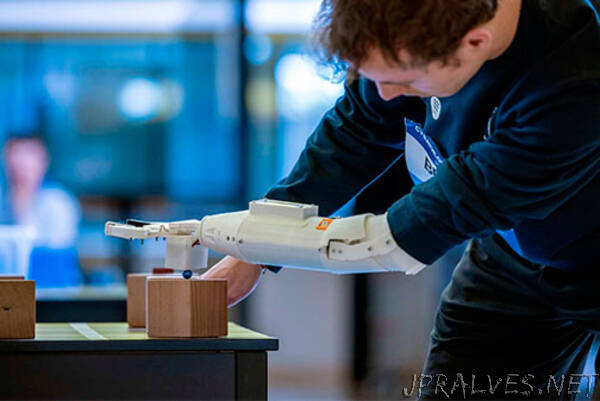
“The Arm2u biomedical engineering team, from the UPC’s Barcelona School of Industrial Engineering (ETSEIB), has designed and manufactured using 3D printing technology a customisable transradial prosthesis that responds to the user’s nerve impulses.
Fifteen bachelor’s and master’s degree students from the Barcelona School of Industrial Engineering (ETSEIB) of the Universitat Politècnica de Catalunya · BarcelonaTech (UPC) share the same dream: improving the quality of life of people with disabilities using assistive technologies. Specifically, the young biomedical engineering team Arm2u is developing a transradial prosthesis—which replaces an arm missing below the elbow—with myoelectric control, i.e. controlled by the natural electrical signals produced by muscle contraction.
After creating a first prosthesis last year, the team has taken a step forward by creating a second prototype, a fully functional robotic arm that enables hand pronosupination (forearm rotation) and opening/closing movements. It is based on EMG sensors, which collect the commands from the patient’s muscle contraction and transforms these electrical impulses into a signal that the microcontroller can understand and use.
The prosthesis is 3D printed with PLA plastic, so it can be produced at a low cost, as explained by Lluís Bonet Ortuño, one of the team leaders: “One of our main goals when developing the prosthesis was to make a prototype with affordable technologies so that it could be produced and modified constantly without a high cost. Using 3D printing, we have created a prosthesis at a much lower cost than similar prostheses on the market.”
Prototype parts
Designed entirely by the Arm2u team, the prototype includes four fundamental parts that work in a coordinated way to enable mobility: the socket, which holds firmly the device onto the limb; the prono, which stores most of the electronics and houses the control and status information elements of the prosthesis; the gripper, a clamp-shaped element to manipulate objects; and finally, the electronic part, which uses an Arduino Uno microcontroller to connect the sensors, motors and other elements for controlling the device and reporting its status to the user.
The second model features several improvements, such as an integrated LCD screen, which reports continuously the status of the prosthesis providing information on battery life, the effort by fingertips, the interior temperature and more.
Additionally, the new design has enhanced adaptability that allows for adjustment to the user’s arm size, and a reduced total weight compared to the previous model, which makes it more comfortable.
Teamwork
Arm2u is a university team created in Barcelona in 2018 and based at the ETSEIB. It is a multidisciplinary group of students from the ETSEIB’s bachelor’s degree in Industrial Technology Engineering, the master’s degree in Industrial Engineering and the master’s degree in Automatic Control and Robotics, with interests in mechanics and electronics applied to biotechnology.
With the aim of pushing the boundaries of the prosthetics industry, the team is organised into three areas: the mechanics department, in charge of developing a conceptual CAD model—both kinetic and static simulations—selecting materials and researching manufacturing systems; the electronics department, in charge of controlling the multiple actuators in the prosthesis and the acquisition of myoelectric signals; and the management department, in charge of developing business and financial plans, managing resources and budget, internal management, communication and others.
According to Aleix Ricou, also a team leader, “the team aims to develop new prostheses to help people in everyday life and continue research in biomedical engineering. We want to become a leading university team for all students who want to learn about this area and we are open to working with anyone who shares our concerns.”
An FME student, the Arm2u carrier
The carrier is a key actor in the design and development of prostheses, being the person for whom the prototype is customised and who tests its functions in a real environment. In the case of the robotic arm designed by the Arm2u team, the carrier is Kyle Briggs, an American student on the master’s degree in Statistics and Operations Research at the UPC’s School of Mathematics and Statistics (FME).
Having used several prostheses throughout his life to do activities such as cycling or working, Kyle admits that he enjoys wearing the prosthesis developed by the ETSEIB team. The student “competed” with the Arm2u prosthesis at the Cybathlon Challenge in Zurich, Switzerland, on 18 May. In this competition, people with physical disabilities test prostheses, developed by research teams from universities and companies around the world, by tackling everyday tasks, such as handling and transporting objects and placing them in a specific position inside cubes with different slots.
Now the team is looking forward to the 2024 Cybathlon, which is the main event, consisting of six tests. Participating in this type of experience is very positive, as it strengthens the bonds between team members. As explained by the students, “carrying out an engineering project and presenting it internationally before other professionals is a rewarding experience, it makes us feel proud and gives us the chance to experience first-hand the kind of situations that we may encounter in our future professional careers. Pursuing a common goal as a team allows us to face this challenge together, giving each other strength and support, and to complement our skills to accomplish the team’s mission.””
